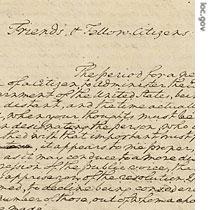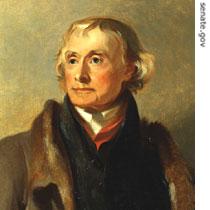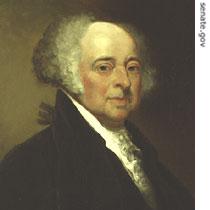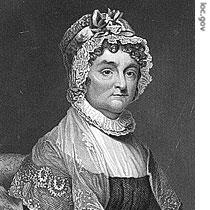VOA慢速英语 2008 0508b
时间:2019-01-11 作者:英语课 分类:VOA慢速英语2008年(五)月
THE MAKING OF A NATION - American History Series: John Adams Is Elected Nation's Second President
Secret activities of his top three advisers 1 helped destroy the Federalist Party. They also produced one of the most important periods in U.S. political history. Transcript 2 of radio broadcast:
07 May 2008
ANNOUNCER:
Welcome to THE MAKING OF A NATION – American history in VOA Special English.
The year seventeen ninety-six saw a change in American politics. That year, the new nation held its third presidential election. And for the first time, there was more than one candidate.

In his farewell address as president, George Washington urged Americans to view themselves as united and to avoid political parties
George Washington won the first two elections without opposition 3.
But now there were two political parties. The Federalists were led by former Treasury 4 Secretary Alexander Hamilton. The Republicans were led by former Secretary of State Thomas Jefferson.
This week in our series, Harry 5 Monroe and Kay Gallant 6 tell the story of the election of seventeen ninety-six and the winner, John Adams.
VOICE TWO:
Most people expected John Adams to win. He was well known throughout the country. He had campaigned for American independence from British rule. He had served as a diplomat 7 in Europe and as the first American minister to Britain. He was Washington's choice for vice 8 president and had served in that position for two terms.
Adams was a Federalist. But he was not -- like other Federalists -- loyal to Alexander Hamilton. So Hamilton worked against Adams. He tried to win electoral support for his own candidate for president, Thomas Pinckney of South Carolina.
VOICE ONE:
At last, the day arrived for counting the votes. The Federalists were shocked by the results. Seventy-one electors voted for John Adams. Sixty-eight voted for Republican Thomas Jefferson. Only sixty voted for Hamilton's choice, Thomas Pinckney.
Under the electoral system used at that time, the candidate with the most votes became president. The candidate with the next largest number of votes became vice president. So America's second president would be John Adams. Its second vice president would be Thomas Jefferson.
VOICE TWO:

Thomas Jefferson
Jefferson had resigned from public service a few years earlier. But he decided 9 to accept his election as vice president. He wrote to his friend James Madison: "I am willing to serve under President Adams. I believe Adams is the only man who can stop Alexander Hamilton from becoming president in eighteen hundred."
To Adams himself, Jefferson wrote that he valued their long friendship and hoped it would continue. Republican newspapers carried articles that were friendly to Federalist John Adams -- the first time they had done so.
(MUSIC)
VOICE ONE:
When Adams and Jefferson took office in March, seventeen ninety-seven, some Federalists believed their political power had come to an end. But Alexander Hamilton, sitting in his law office in New York City, did not lose hope. He knew he still controlled the top Federalist leaders in Congress.
More than that, he believed he knew how to control John Adams.
The new president made Hamilton's job easy. Adams kept President Washington's cabinet. The three men who were Washington's chief government officials would now advise President Adams. Washington had appointed them at Hamilton's request. And they always did what Hamilton told them to do.
VOICE TWO:

John Adams
Historians still cannot explain why John Adams -- a man who did not like or trust Alexander Hamilton -- kept the three cabinet secretaries. If the secretaries had been men of great ability, then that might be an explanation. But they were not.
One was a secretary of state who knew very little about foreign relations. The second was a secretary of the treasury who knew less about finance. The third was a secretary of war who knew nothing about military matters and defense 10.
Adams may have kept these men as an act of party unity 11. Or he may have kept them because he could not get anyone else.
VOICE ONE:
Whatever his reason, the decision was politically costly 12, for the three men worked together against him. President Adams told his cabinet secretaries what he wanted. Then they went to Alexander Hamilton for orders.
In the end, these secret activities helped destroy the Federalist Party. And so, they made the administration of John Adams one of the most exciting and important periods in the political history of the United States.
(MUSIC)
VOICE TWO:
As we said earlier, John Adams was a great man and a true patriot 13. He was born in the village of Braintree, Massachusetts, in seventeen thirty-five. He wanted to be a farmer. But he was sent to Harvard College to study to be a clergyman. He had no interest in this life and became a lawyer, instead.
In the years before the American Revolution, John Adams wrote articles about the injustice 14 of British rule. He also became a delegate to the First Continental 15 Congress. He urged the Congress to appoint George Washington as commander-in-chief of American forces. He argued for the creation of an American Navy. And he helped develop the resolutions declaring American independence.
VOICE ONE:
Adams spent most of the war years in Europe. He helped win Dutch recognition of the new American nation. He also negotiated a loan from the Dutch government, as well as a treaty of friendship and commerce. After American forces defeated British forces, he helped negotiate the peace treaty between the two countries. Then he served as the first American minister to Britain.
Adams, like other Federalists, believed that men of money and position should govern America. He did not trust the common people. He did not support democracy. He once wrote: "In the city of Boston, there are four noble families. They are just as much a noble class as the nobility of Britain or Spain. And it is good that this aristocracy exists."
Yet John Adams had a deep love for his country. He would do whatever was necessary to keep it free.
(MUSIC)
VOICE TWO:

Abigail Adams
Adams was extremely intelligent and was a thoughtful, lively writer. However, he often acted very coldly and said little. Or he became angry easily. His best friend probably was his wife, Abigail. He had few other friends.
Adams' personal weaknesses caused trouble during his presidency 16. He belonged to the Federalist Party. But he did not want to become involved in party arguments. And he did not want to make all the compromises necessary in the world of politics. So, other Federalists often worked against him.
VOICE ONE:
Not many people really liked this difficult, aristocratic man. Strangely enough, one of the few who did was Thomas Jefferson. This was strange, because Jefferson's political philosophy was opposed to everything Adams represented.
Perhaps Jefferson liked Adams because he respected him for his intelligence. Perhaps he never forgot that Adams had fought hard for American independence. Or perhaps he understood that, under Adams' selfishness and weaknesses, there was an honest man who would do anything for his country.
However, there were not many like Jefferson. Most men in politics just did not like Adams. They used this fact as a weapon. It was such a strong weapon that it made people forget what Jefferson remembered. John Adams had a good mind and loved the United States. He had given many years of his life to the young nation and should be honored for it.
VOICE TWO:
Federalist leaders, especially, appealed to Adams' weaknesses when they wanted his support.
For example, they knew Adams was jealous of President Washington. Adams felt Washington received too much honor, while he received not enough. Sometimes, if Adams knew the president's opinion on a question, he would develop a different opinion. Yet Washington -- like Jefferson -- respected Adams. He felt the new nation needed Adams' skills.
VOICE ONE:
Adams won the presidency in seventeen ninety-six. But his term would be difficult. His own party, the Federalists, did not trust him. And he did not have the support of the general public. The people knew he did not like them.
Adams did not expect the job to be easy. He once wrote: "In politics, a man must always walk on broken glass and red-hot iron. It is not easy to do this when you are not wearing shoes. But some men must do it. There are many dangerous things that have to be done for our country in these dangerous times. If nobody else will do them, I will."
We will continue the story of John Adams next week.
(MUSIC)
ANNOUNCER:
Our program was written by Harold Braverman and Christine Johnson. The narrators were Harry Monroe and Kay Gallant. Join us again next week for THE MAKING OF A NATION, an American history series in VOA Special English. Transcripts 17, podcasts and MP3s of our programs are at voaspecialenglish.com.
- a member of the President's favoured circle of advisers 总统宠爱的顾问班子中的一员
- She withdrew to confer with her advisers before announcing a decision. 她先去请教顾问然后再宣布决定。
- A transcript of the tapes was presented as evidence in court.一份录音带的文字本作为证据被呈交法庭。
- They wouldn't let me have a transcript of the interview.他们拒绝给我一份采访的文字整理稿。
- The party leader is facing opposition in his own backyard.该党领袖在自己的党內遇到了反对。
- The police tried to break down the prisoner's opposition.警察设法制住了那个囚犯的反抗。
- The Treasury was opposed in principle to the proposals.财政部原则上反对这些提案。
- This book is a treasury of useful information.这本书是有价值的信息宝库。
- Today,people feel more hurried and harried.今天,人们感到更加忙碌和苦恼。
- Obama harried business by Healthcare Reform plan.奥巴马用医改掠夺了商界。
- Huang Jiguang's gallant deed is known by all men. 黄继光的英勇事迹尽人皆知。
- These gallant soldiers will protect our country.这些勇敢的士兵会保卫我们的国家的。
- The diplomat threw in a joke, and the tension was instantly relieved.那位外交官插进一个笑话,紧张的气氛顿时缓和下来。
- He served as a diplomat in Russia before the war.战前他在俄罗斯当外交官。
- He guarded himself against vice.他避免染上坏习惯。
- They are sunk in the depth of vice.他们堕入了罪恶的深渊。
- This gave them a decided advantage over their opponents.这使他们比对手具有明显的优势。
- There is a decided difference between British and Chinese way of greeting.英国人和中国人打招呼的方式有很明显的区别。
- The accused has the right to defense.被告人有权获得辩护。
- The war has impacted the area with military and defense workers.战争使那个地区挤满了军队和防御工程人员。
- When we speak of unity,we do not mean unprincipled peace.所谓团结,并非一团和气。
- We must strengthen our unity in the face of powerful enemies.大敌当前,我们必须加强团结。
- It must be very costly to keep up a house like this.维修这么一幢房子一定很昂贵。
- This dictionary is very useful,only it is a bit costly.这本词典很有用,左不过贵了些。
- He avowed himself a patriot.他自称自己是爱国者。
- He is a patriot who has won the admiration of the French already.他是一个已经赢得法国人敬仰的爱国者。
- They complained of injustice in the way they had been treated.他们抱怨受到不公平的对待。
- All his life he has been struggling against injustice.他一生都在与不公正现象作斗争。
- A continental climate is different from an insular one.大陆性气候不同于岛屿气候。
- The most ancient parts of the continental crust are 4000 million years old.大陆地壳最古老的部分有40亿年历史。
- Roosevelt was elected four times to the presidency of the United States.罗斯福连续当选四届美国总统。
- Two candidates are emerging as contestants for the presidency.两位候选人最终成为总统职位竞争者。
- Like mRNA, both tRNA and rRNA are transcripts of chromosomal DNA. tRNA及rRNA同mRNA一样,都是染色体DNA的转录产物。 来自辞典例句
- You can't take the transfer students'exam without your transcripts. 没有成绩证明书,你就不能参加转学考试。 来自辞典例句